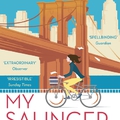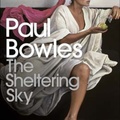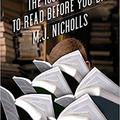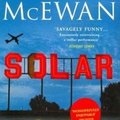Colum McCann: Let the Great World Spin
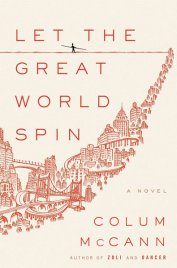
I could hardly say that I suffer from burnout as a reader, still, it doesn't happen too often that I'm so enthralled by a novel that I can hardly wait for the day to pass until I can continue with it. Let the Great World Spin was such a novel.
This is the novel of an era and a city, and of course of the people who inhabit the city – people who drift together and drift apart in a seemingly random fashion, in New York, 1974. One of the main motifs of the book is the feat of the French high-wire artist, Philippe Petit who walked the distance between the Twin Towers in August 1974, several hundred feet above the spellbound New Yorkers. This event (or the somewhat fictionalized version of it) serves as the core of this novel because it is something every character relates to in one way or the other – they either watched the wire-walk, or heard about it, or took photos of it, and so on.
The story evolves very slowly, and at first it seems that there's no connection at all between the different storylines. In each chapter we encounter characters/narrators who live in absolutely different universes and whose fates seem to have nothing to do with each other, even if they live in the same city. There's an Irish monk living in the Bronx ghetto who does charity work with the whores of the neighborhood, while doing a furious battle with himself and God; there's an old judge who started out as a young idealist planning to make the world a better place all by himself, and his brokenhearted wife who lost their son in the Vietnam War; there's the less-than-successful artist couple who cause a fatal accident, and the wife can't stop blaming herself; and there's a young prostitute convicted for robbery. The characters move in so different spheres of life that at first it's hard to imagine how their fates might come together.
But Colum McCann writes with unbelievable ease and grace, and he connects the events – told by different narrators, seen from different angles – without the slightest trace of strain. Reading this novel is sheer pleasure – McCann's voice is pure and natural, he doesn't employ any of the usual postmodern tricks and annoying mannerisms, and the way he weaves the storylines together is simple and effortless.
He writes beautifully and accurately about every character, and the narrative voice and the outlook of each character is unique and believable. But McCann isn't only excellent at writing about human beings – the most amazing character of his novel is New York City itself. The (fictitious) New York of this book is dark-colorful, enigmatic and effervescent – it's not an idyllic city, but it's very attractive, and it holds infinite promises and infinite dangers for all its inhabitants. McCann's New York is a magical place where it's indeed possible for everyone and everything to interconnect. And his New York is as memorable and vivid as J. D. Salinger's and Paul Auster's New York.
This is the novel of an era and a city, and of course of the people who inhabit the city – people who drift together and drift apart in a seemingly random fashion, in New York, 1974. One of the main motifs of the book is the feat of the French high-wire artist, Philippe Petit who walked the distance between the Twin Towers in August 1974, several hundred feet above the spellbound New Yorkers. This event (or the somewhat fictionalized version of it) serves as the core of this novel because it is something every character relates to in one way or the other – they either watched the wire-walk, or heard about it, or took photos of it, and so on.
The story evolves very slowly, and at first it seems that there's no connection at all between the different storylines. In each chapter we encounter characters/narrators who live in absolutely different universes and whose fates seem to have nothing to do with each other, even if they live in the same city. There's an Irish monk living in the Bronx ghetto who does charity work with the whores of the neighborhood, while doing a furious battle with himself and God; there's an old judge who started out as a young idealist planning to make the world a better place all by himself, and his brokenhearted wife who lost their son in the Vietnam War; there's the less-than-successful artist couple who cause a fatal accident, and the wife can't stop blaming herself; and there's a young prostitute convicted for robbery. The characters move in so different spheres of life that at first it's hard to imagine how their fates might come together.
But Colum McCann writes with unbelievable ease and grace, and he connects the events – told by different narrators, seen from different angles – without the slightest trace of strain. Reading this novel is sheer pleasure – McCann's voice is pure and natural, he doesn't employ any of the usual postmodern tricks and annoying mannerisms, and the way he weaves the storylines together is simple and effortless.
He writes beautifully and accurately about every character, and the narrative voice and the outlook of each character is unique and believable. But McCann isn't only excellent at writing about human beings – the most amazing character of his novel is New York City itself. The (fictitious) New York of this book is dark-colorful, enigmatic and effervescent – it's not an idyllic city, but it's very attractive, and it holds infinite promises and infinite dangers for all its inhabitants. McCann's New York is a magical place where it's indeed possible for everyone and everything to interconnect. And his New York is as memorable and vivid as J. D. Salinger's and Paul Auster's New York.


